
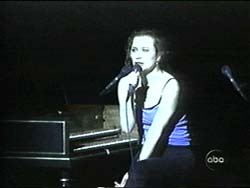
This is the entire transcript. It may not be perfect, but it is damn near close!
(Tori's quotes in boldface)
Dianne Sawyer: Tori Amos wrote a stunning song about what it is like to be raped. "You can laugh," she wrote, "It's kinda funny the things you think at times like these." That album won both critical acclaim and commercial success. And tonight for the first time on television, she tells Nancy Collins about the trauma of the rape, and about reclaiming her soul.
The piece begins with various videos being shown. There are also many photos shown with her music playing in the background, and they all appear to be from Tori's 'All These Years' Biography. The videos they played were:
Caught A Lite Sneeze
Cornflake Girl
Pretty Good Year
Talula
China
Winter
Silent All These Years
Hey Jupiter
Live footage of her singing:
Yes Anastasia
Me and a Gun
Honey
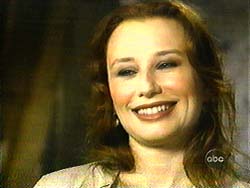
Nancy Collins, the interviewer, begins speaking:
What is it about the music of this tiny red-headed preacher's daughter that sells out concerts across the country and turned this classically trained pianist into a pop star after only 3 albums? Her poetic lyrics are evocative, resonating with the familiar and the forbidden. She's sensual, soul-searching, irreverent, and though she's become a cult figure who's fans line up to hear her personal journey, in the end she's a girl with her piano, and a story.
"My strength isn't as a technician, my strength is as a composer. I didn't want to play all these dead guy's music to be honest with you. I was like, you know, they did something fantastic. But who's going to be breaking those boundaries and limitations for OUR time?"
Some would say Tori Amos. She grew up rebellious, the daughter of a Methodist minister and his part-Cherokee wife.
Interviewer: One thinks it's always hard to be the preacher's kid. Did your father expect you to tow a religious (? have no idea what word she used here!)

"I went to church 4 times a week until I was 21. My father would really have liked me to write religious music."
She began playing the piano when she was 2. At 5, she was the youngest pupil to be accpeted into Baltimore's prestigious Peabody Institute, where she learned Mozart and Brahms.
"Ever since I remember, I would crawl up and play. And I always knew how to play."
When Tori was 11 , Tori lost her scholarship to the Peabody.
"I just didn't fit in. They didn't think I was ever going to be a concert pianist, and I wasn't."
Two years later, it was her father who came up with the unorthodox idea of the next leg of her career.
"My father looked at me finally after a lot of talking and pulling back and forth..what are you going to do with your life?..why do I have to do anything with my life? I'm 13, why, blah blah, you know the whole thing that happens, and I said 'I want to play my music.' And he said 'Alright then, get dressed. Dress up.' And we went down and we knocked on about 13 or 14 doors that night, just knocked..."
Interviewer: On Bars?
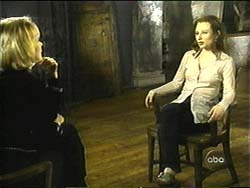
"On bars, and he said, 'My daughter's really good, um, can we come in and play for you? And there was a lot of (Tori gives a YOU GOT TO BE KIDDING look) that going on, and the gay clubs opened the door. They said,' bring her in then.' I was very influenced by these wonderful gay men, who gave me the confidence to dress up, and taught me how to put on makeup, and gave me the courage on , you know, how to kiss a boy. They taught me how to become a young woman. "
Interviewer: What was it about their experience that so informed you?
"Tenderness. They taught me about tenderness."
At 21, Tori headed to Los Angeles, and formed a band. It's only album flopped miserably.
"When your a failure in the entertainment business, they're quite vicious. But it was my great gift. That was the greatest gift I ever had..."
She sat down, alone at her piano, and began listening to her inner voice.
"...And I said, 'you know, What is my intention as a musician?' And I started to remember what that was. And I said whether anybody comes here to listen to what I do or not, I'm going to finally say what I've always thought, what has been hushed up, which I've hushed up. "
The result was her first hit album, Little Earthquakes.
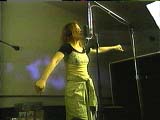
"I had to write that work, to begin to feel like I wanted to be my own skin again. So just feeling that was such an incredible feeling, like 'wow, I do have thoughts about things and they're MY thoughts.'"
It's centerpiece was a haunting anthem called Me and a Gun, which spoke to many women. Tori Amos sang about the time she was raped. Though it happened in her early 20's, she never talked about it to anyone.
"I saw Thelma and Louise, and it brought up things that even I didn't understand. And I think there are some things that I don't want to remember."
One night, after she finished playing at a piano bar, Tori offered a ride to someone she thought was a friend.
Interviewer: Did you ever bring charges, did you go to the police or anything?
"No...It's not that simple. Sometimes you're in a situation where if you come forth, you're nailed. You...the law isn't supportive of violent situations for women. Come on...I was a nightclub singer, I dressed sexy. Look, let's not kid each other, my case was closed before I began."
Interviewer: Did you think it was your fault?
"Yeah...I did. Um, violence is such a strange experience. If you...If you feel that kind of hate from another person, it's like, it gets into your cells, it gets into every part of your being. And so I've been commiting myself to becoming the phoenix out of the ashes, for myself, and Me and a Gun has been a great teacher for me. It's quite a double edged sword, that song."
Interviewer: How so?
"There's a place, where when I sing it every night, I'm trying to get to. Sometimes I get to it, sometimes I don't...where I'm just trying to free the demons. My commitment is to crossing over that river, the river of victimhood. But you have to be in that river, you will be in that river if you have been violated. I'm really *sigh* at a place where I believe you can heal. You can heal, and yet not forget. And it's a new way of thinking."
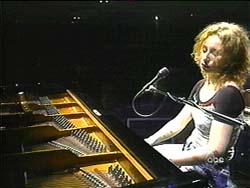
These days the healing continues on tour. She and her tightly knit crew will be delivering the gospel according to Tori for the next 6 months. Just a girl, and her piano, on the road.
Interviewer: How do you feel about your piano?
"The piano was very much my identity for a long long time. Now I feel like we're partners.I think the real musicians, the real...the ones that feel it in their soul, hear their instrument speaking."
Dianne Sawyer: Tori Amos' current US tour is now hitting the east coast. Her latest album Boys For Pele entered the Billboard charts at #2 and has just gone platinum.
Please give me feedback, comments, or suggestions about my site.
Email me (Michael Whitehead) at: mikewhy@iglou.com
